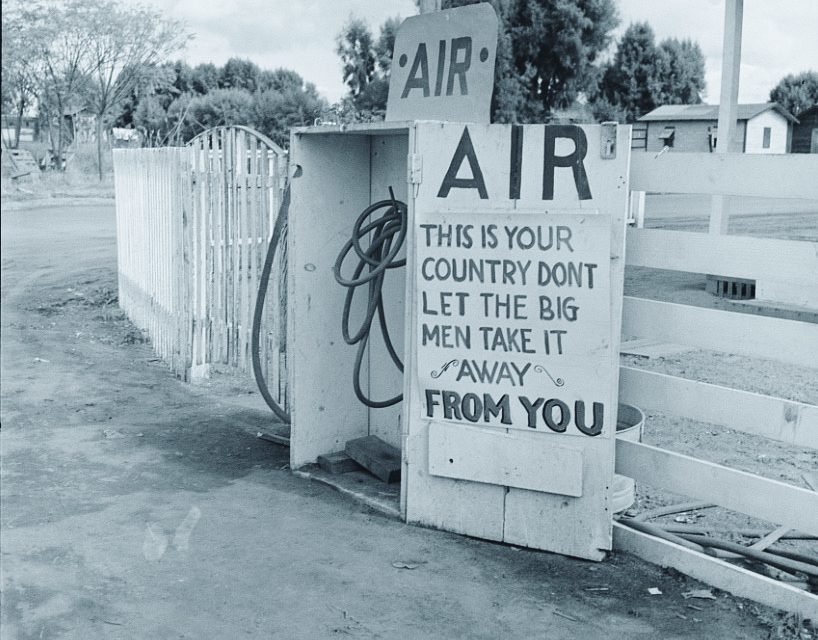A well-organized campaign to privatize America’s most vital public services and infrastructure is moving from the shadows to the spotlight. From the U.S. Postal Service and the National Park System to the personal data managed by the Social Security Administration, today’s right-wing influencers, corporate billionaires, and allies of Donald Trump are targeting these public goods for private profit.
Privatization isn’t just a threat—it’s an active project. It’s being mapped out in documents like Project 2025 and Trump’s Agenda 47, which aim to hand over critical public functions to unaccountable corporate interests under the guise of “efficiency” and “cost savings.” The truth? It’s about control, profit, and weakening unions and democratic oversight.
The War on the USPS: Still Underway
The United States Postal Service remains a prime target. For decades, right-wing forces have worked to undermine the public’s trust in the Postal Service. They imposed crushing mandates, such as the 2006 retiree health prefunding law, installed political operatives in leadership, and promoted “cost-saving” service reductions—all designed to weaken public confidence and pave the way for privatization.
Now, with Donald Trump and MAGA-aligned candidates in power in federal and state offices, this threat is growing. Musk voiced support at a tech conference in March for privatizing the Postal Service, saying, “We should privatize anything that can reasonably be privatized,” the New York Times reported. Meanwhile, far-right think tanks and billionaire donors are lining up to capitalize.
Here’s what’s at stake if USPS is privatized:
- Americans lose a trusted, affordable, and universal service—particularly devastating in rural, Indigenous, and underserved urban communities.Post office closures could leave entire towns without essential services.
- Cost hikes and mail delays would disproportionately hurt seniors and veterans who rely on the mail for medications and benefits.
- The more than 630,000 unionized postal workers—including 73,000 veterans—would face job loss, benefit cuts, and weakened protections.
- The USPS’s role in our democracy—delivering ballots, voter registration forms, and civic information—could be manipulated for partisan gain.
While Trump and MAGA-aligned leaders push forward, a bipartisan coalition in Congress is fighting back. Legislation sponsored by lawmakers like Rep. Alexandria Ocasio-Cortez (D-NY) and Rep. Brian Fitzpatrick (R-PA), as well as Sen. Mark Warner (D-VA) and Sen. Lisa Murkowski (R-AK), aims to block any attempt to privatize the Postal Service. Congress must act decisively to pass this legislation.
Keeping the USPS public shouldn’t be partisan—it’s common sense. To back privatization is to put corporate donors ahead of working people and democracy itself.
Data for Sale: Lutnick, SSA, and the New Oil
Howard Lutnick, billionaire CEO of Cantor Fitzgerald and a top Trump ally, is pushing a privatization scheme with massive implications: the monetization of government-held personal data. In interviews, Lutnick has called data from the Social Security Administration “the new oil” and suggested it should be sold to private firms for use in finance, marketing, and surveillance.
This isn’t hypothetical. The infrastructure to commercialize public data is already being built—often under the radar—through public-private partnerships and contract outsourcing.
What Lutnick and others are proposing would blow a hole in Americans’ right to privacy. It would give Wall Street access to your earnings history, employment data, and more—all without your consent.
National Parks for Sale?
Even America’s natural wonders aren’t safe. Elon Musk has proposed privatizing services in national parks under the banner of “eco-innovation.” He’s suggested Tesla-run transport systems in Yosemite and SpaceX-led education centers in Yellowstone. It’s a vision that replaces public stewardship with corporate branding and luxury access.
Meanwhile, groups aligned with Project 2025 are calling for “asset rationalization”—a sanitized phrase for selling off public lands, closing parks deemed “underused,” and outsourcing park services to corporate contractors.
The Labor Response: Hold the Line
America’s labor movement is on the frontlines of this battle. Postal unions like the American Postal Workers Union (APWU) and the National Association of Letter Carriers (NALC) are mobilizing to stop USPS privatization. Federal worker unions representing SSA staff and park rangers are sounding the alarm about the creeping transfer of authority to private contractors.
Privatization is more than a policy threat—it’s an attack on union jobs, public accountability, and the very idea of the common good. Every asset sold is a loss for democracy and a gain for the billionaire class.





